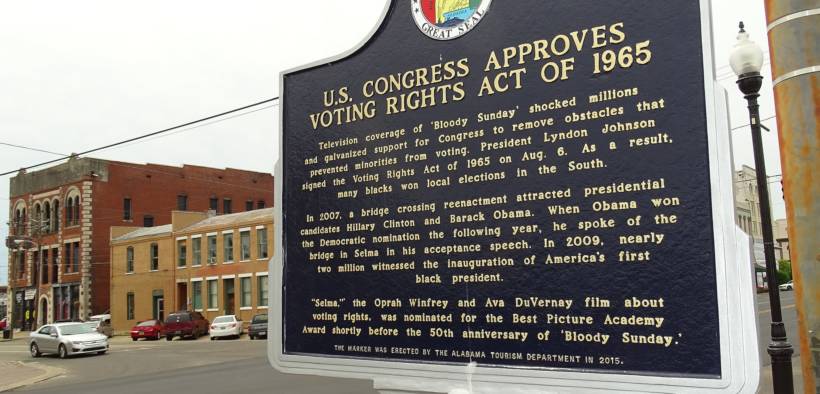Landmark Voting Rights Bill Passes House

“Voting rights should be a nonpartisan issue, and the fact that in this amendment they would try to politicize voting rights – we should all, ALL, be appalled by that.”
In a highly partisan vote, 227 Democrats and one Republican legislator in the U.S. House of Representatives passed H.R. 4 or the Voting Rights Advancement Act of 2019 on Friday. H.R. 4 now faces a much stiffer challenge in the Republican-controlled Senate where majority leader Mitch McConnell previously refused to hold a vote on the bill while it was attached to H.R. 1 or the For the People Act – a Democrat introduced bill that sought to reduce dark money in politics, create public financing of elections and strengthen ethics rules.
What is HR 4?
H.R. 4, introduced by U.S. Rep. Terri Sewell (AL-07) and Sen. Patrick Leahy (D-VT), was written in direct response to the Supreme Court’s 2013 Shelby County v. Holder decision which gutted the 1965 Voting Rights Act by striking down the preclearance provision in Section 5 of the Voting Rights Act. Prior to the court’s decision, any state with a history of racial discrimination was required to “preclear” or prove that any new voting laws, such as requiring voter ID, would not discriminate based on race.
According to the ACLU, the preclearance provision was one of the Voting Rights Act’s strongest features because it preempted the passing of discriminatory voter legislation.
“Since its enactment in 1965, Section 5 has had a massive impact in dismantling voting discrimination — the biggest of any congressional action — successfully blocking more than 1,000 instances of discriminatory election rules advanced by state and local officials,” said the ACLU in a press release.
However, Shelby County invalidated the formula used for determining which locations were subject to the preclearance requirement. The court, in its majority opinion, urged Congress to adopt a new formula for determining what locations were subject to the Voting Rights Act’s preclearance provision.
H.R. 4 did just that, establishing a new formula for determining what locations were subject to preclearance:
“A state and all of its political subdivisions shall be subject to preclearance of voting practice changes for a 10-year period if (1) 15 or more voting rights violations occurred in the state during the previous 25 years; or (2) 10 or more violations occurred during the previous 25 years, at least one of which was committed by the state itself. A political subdivision as a separate unit shall also be subject to preclearance for a 10-year period if three or more voting rights violations occurred there during the previous 25 years,” says the bill.
In addition to the revised preclearance formula, H.R. 4 establishes a new preliminary injunction standard so that any potentially discriminatory voting changes would be unenforceable until a lawsuit alleging discrimination is settled. The act also requires locations to notify the public of any voting changes prior to elections and would give the Department of Justice the authority to send observers to monitor elections.
News of the passing of H.R. 4 was celebrated widely on Twitter, but restoring the 1965 Voting Rights Act back to its pre-Shelby County strength still has a tough journey ahead through the Senate:
Voting is personal to me because it was on the streets of my hometown, Selma, that foot soldiers shed their blood on the Edmund Pettus Bride so that all Americans—regardless of race—could vote!! I am so proud the House voted to #RestoreTheVote!
Now, on to the Senate! pic.twitter.com/POoTun7P65
— Rep. Terri A. Sewell (@RepTerriSewell) December 6, 2019
Today, the House passed H.R. 4, the Voting Rights Advancement Act, which responds to the Shelby County v. Holder decision, repairs the Voting Rights Act, and ensures that all Americans can exercise their right to vote. pic.twitter.com/Wr7svKmDnN
— John Lewis (@repjohnlewis) December 6, 2019
“Voting rights should be a nonpartisan issue, and the fact that in this amendment they would try to politicize voting rights – we should all, ALL, be appalled by that.”
If you missed @RepTerriSewell speaking truth to power today, please watch. This is what leadership looks like. pic.twitter.com/CS7tQ3NY3t
— Vanita Gupta (@vanitaguptaCR) December 6, 2019








What good is a vote when the ballots list only plutocratic puppets?
And what good is a vote when the voter is an utter ignoramus?